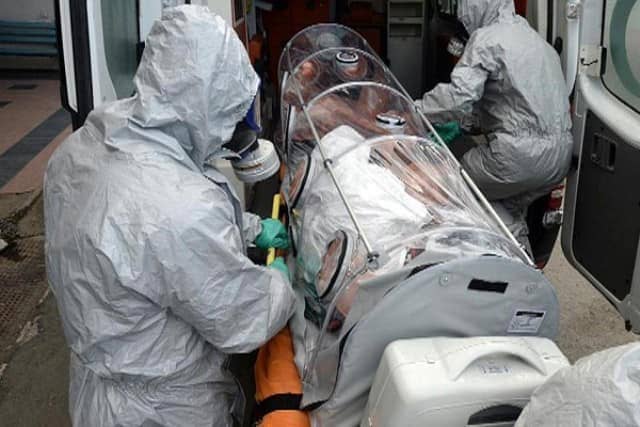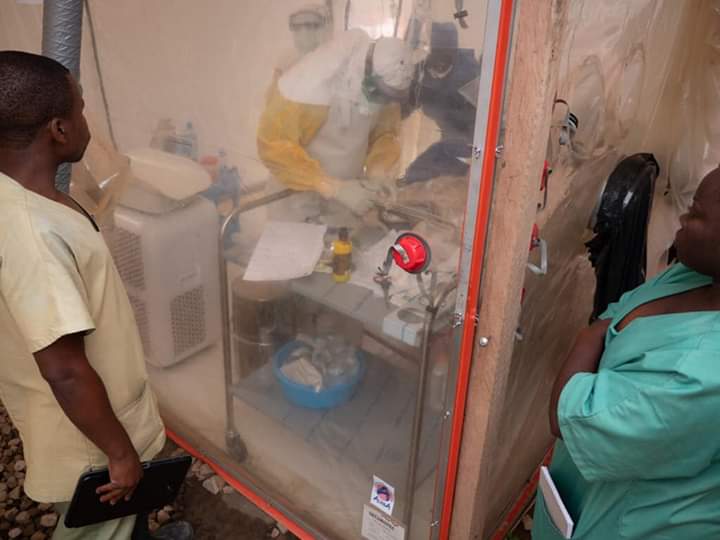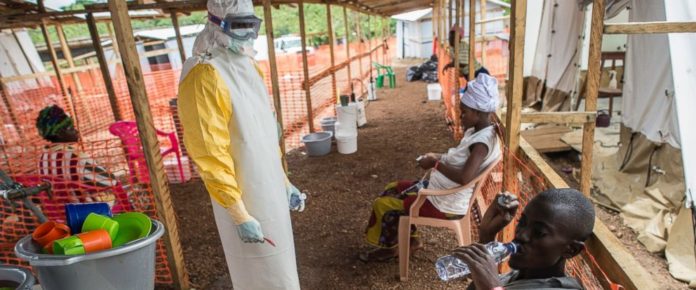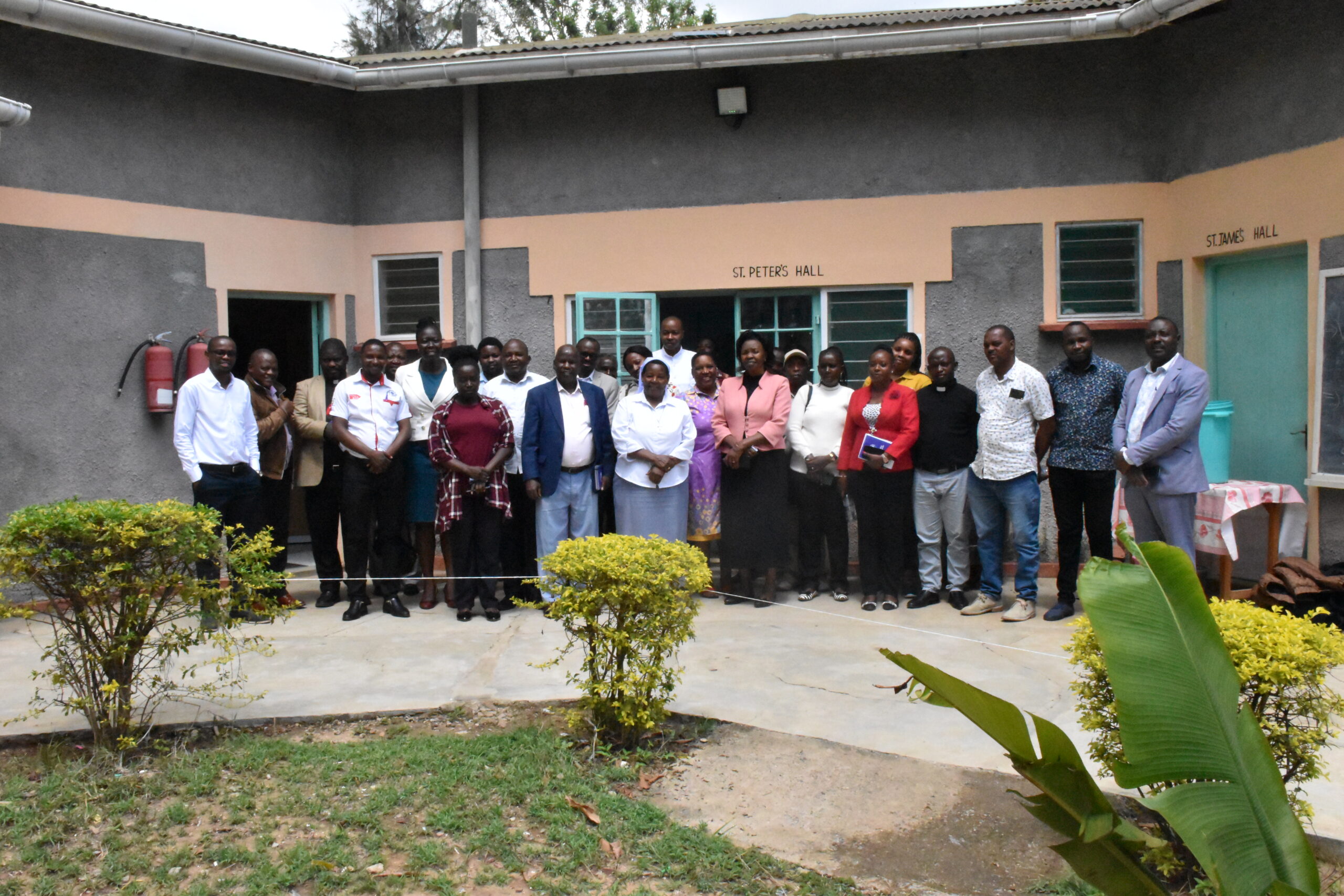By Nina Mitch
For many Christians around the world, laying of hands by their clergy is a norm. More so laying of hands on the sick and those that need deliverance is seen as a biblical practice but nothing prepared Pastor Kubuya Mastaki Daniel for what he was about to face in the fair weather of 4th of July.
The 46-year-old well-revered Pastor at the Christian Union Church of Jerusalem left his hometown of Bukavu in Eastern DRC for a gospel mission in Butembo, the epicenter of the Ebola hemorrhagic fever that has so far killed over a thousand victims in its wake.
During his stay in Butembo, Mastaki preached the word of God with great charisma in different churches, won many souls to Christ, he prayed for the afflicted and the sick, laid hands on them without knowing the risk and the danger he exposed himself to.
Five days later, the spirit-filled Pastor started manifesting unusual symptoms. The stage was seemingly set for a battle between his anointing and a yet to be known infection. It started with the sudden onset of intense fever, accompanied by chills, diarrhea, and extremely intense fatigue.
Totally oblivious of the relative similarities between his symptoms and Ebola, Mastaki reached out to a nurse from a local hospital in Butembo for home care. After a while, he embarked on a journey in a bus with more than 15 passengers to Goma, a town 300km away from Butembo with the intentions to continue his apostolic assignment.
But he barely started the assignment when his health deteriorated. He approached a health center to continue his treatment and soon after, medical officials on the ground who suspected Ebola alerted the response teams in Goma, a city 100 kilometers from neighboring Rwanda.

Thereafter, he was transferred to an Ebola Treatment Centre, where laboratory tests later confirmed that he was infected with Ebola.
According to the medics, no cure has been found yet for the Ebola virus which is transmitted by direct contact with blood, body fluids, or skin contact of patients or individuals who have died of the disease. The closest guess would point to the pastors laying of hands and interaction with the sick and afflicted in Butembo.
A good intention to bring deliverance to the sick and afflicted are putting the men and women of the cloth into an awkward position, between following the teachings of the Gospel and being cautious of the virus.
Pastor Mastaki has become infamous as the first case of Ebola detected in the city of Goma where he hails from, said to be home to over 1 million inhabitants.
Not quite long, the news spread like a bushfire through social media and residents of Goma were thrown into panic as their worst fears have finally been confirmed. The one meant to bring the balm of Gilead has been ravished by Ebola.
The Governor of North Kivu, Karly Nzanzu Kasivita, had to step in and call for calm and vigilance.
“I call on the population of Goma and its surroundings to keep calm. I urge all the population to cooperate with the teams by observing the measures of hygiene and prevention but also reports any suspicious case of Ebola cases, ” said Kasivita.
Mastaki, unfortunately, succumbed on the way to Butembo on Monday, 15 July, where he had been transferred to receive comprehensive treatment.
“As you know, a case of Ebola was discovered here in Goma on July 14. Our response teams took care of the case directly, but unfortunately, I can confirm the death of the patient who died on the way going to Butembo because that’s where he needed to be treated because there was never an Ebola case in Goma City, “said Kasivita.
The confirmed case in Goma, speaks to how easy for the disease to spread and also fuel fears of a new outbreak of the disease that has ravaged the two provinces of North Kivu and Ituri in the Democratic Republic of Congo while harvesting more than 1600 lives into its fold since inception.
Due to the large influx of travelers from areas affected by the epidemic, the Ministry of Health and the World Health Organization (WHO) had prepared themselves to respond to Ebola for 8 months.

The rapid detection of the first case in this city of nearly two million people proves the effectiveness of the city’s preparedness to deal with any potential Ebola patients,” said Oly Ilunga, Ministry of health in DRC.
According to the ministry of health, the other 18 high-risk passengers have already been identified. The owner of the bus on which the Pastor traveled in, presented himself to the response teams for the vaccination alongside the other passengers and the bus driver.
In a climate of insecurity and distrust of aid workers, the fight against Ebola is unprecedented. Two members of an Ebola response team were murdered this weekend. Those two members including an alleged community and a street leader were both murdered at their homes in Mukulia, on the border of Butembo city. Sadly, this is not new as the Ebola Response Operation has suffered 198 attacks that have left seven dead and 58 wounded since the beginning of the year.
The regions of Ituri and North Kivu provinces most affected by the Ebola virus have poor infrastructure, experiencing a lot of political instability and persistent conflicts involving many armed groups, and community mistrust of national authorities and foreigners.
Mastaki’s death was followed by the declaration of the Ebola Virus Disease (EVD) outbreak in DRC as a Public Health Emergency of International Concern (PHEIC) by the Director-General of WHO, Dr. Tedros Adhanom Ghebreyesus.
“It is time for the world to take notice and redouble our efforts. We need to work together in solidarity with the DRC to end this outbreak and build a better health system,” said Dr. Tedros. “Extraordinary work has been done for almost a year under the most difficult circumstances. We all owe it to these responders coming from not just WHO but also the government, partners, and communities to shoulder more of the burden” he added.

The declaration followed a meeting of the International Health Regulations Emergency Committee for EVD in the DRC. The Committee cited recent developments in the outbreak in making its recommendation, including the first confirmed case in Goma, a city of almost two million people on the border with Rwanda, and the gateway to the rest of DRC and the world.
This was the fourth meeting of the Emergency Committee since the outbreak was declared on 1st August 2018.
The Committee expressed disappointment about delays in funding which have constrained the response. They also reinforced the need to protect the livelihoods of the people most affected by the outbreak by keeping transport routes and borders open. It is essential to avoid the punitive economic consequences of travel and trade restrictions on affected communities in the two provinces.
“It is important that the world follows these recommendations. It is also crucial that states do not use the PHEIC as an excuse to impose trade or travel restrictions, which would have a negative impact on the response and on the lives and livelihoods of people in the region,” said Professor Robert Steffen, chair of the Emergency Committee.
Since it was declared almost a year ago the outbreak has been classified as a level 3 emergency – the most serious – by WHO, triggering the highest level of mobilization from WHO. The UN has also recognized the seriousness of the emergency by activating the Humanitarian System-wide Scale-Up to support the Ebola response.
“This is about mothers, fathers, and children – too often entire families are stricken. At the heart of this are communities and individual tragedies. The PHEIC should not be used to stigmatize or penalize the very people who are most in need of our help” noted Dr. Tedros with a lot of concern.
So far, the Ebola outbreak that began in Beni town on First of August 2018, has put the Congolese government on the spot and the enormous task before it. The government has identified the complexity of the response and risk factor of the disease to be exacerbated by the high density and mobility of the population across a geographical area that covers 23 health zones spread over the two provinces.
WHO estimates that the risk of spread within other provinces and neighboring DRC countries is very high.













